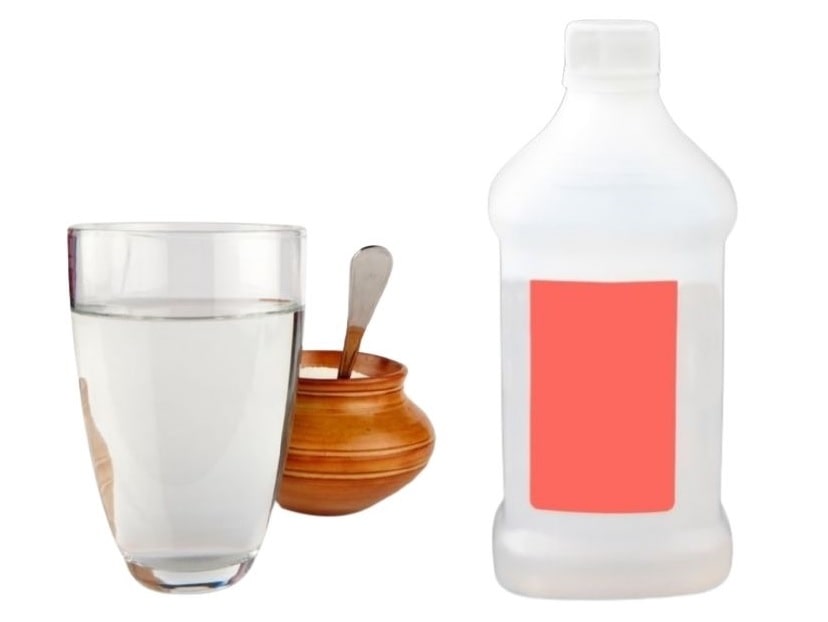Does salt dissolve in alcohol?
We all know that salt dissolves in water, but what about alcohol? Does salt dissolve in alcohol?
[toc]
Alcohol can dissolve salt to some extent, but it cannot produce a homogeneous saline solution like salty water.
Instead, the salt reacts with the water content of alcohol forming a salty water solution and pushing alcohol on top of this layer as a lighter liquid.
What this means is that salt will not dissolve in pure alcohol, but it can dissolve in an alcohol solution that is diluted with water. This process is often known as “salting out” in the scientific community used to purify compounds.
Why salt doesn’t completely dissolve in alcohol?
A solution is generated when one material dissolves in another creating a homogenous mixture. We name the substance being dissolved as the solute and the substance doing the dissolving job as the solvent.
In order to call one compound soluble in another, they must create a stable mixture that is able to remain mixed together.
The solvent and solute must be in contact with each other and once the reaction is complete, there should be no separation and the solution should be homogenous.
This can happen only through electrostatic interactions between the solvent and solute molecules.
Salt dissolves in water because both are polar compounds with a similar electrical charge (both can form ions) and they mix well together to form a homogeneous solution.
However, alcohol is as much not as polar as water and doesn’t have similar electrical interaction with salt as water does.
Since the electrostatic interactions between salt and alcohol are not as strong they will not mix well together.
However, what salt does is interact with the water content of alcohol to form a salty water solution and push alcohol to the top of this layer creating two layers of liquids.
So we cannot completely disregard the fact that salt does dissolve in alcohol to some extent.
More Water Content = More Dissolution
What we see is that as the water content in alcohol increases, the dissolution of salt also increases.
This makes sense because as the water content in alcohol increases, there are more opportunities for salt ions to interact with the water molecules in alcohol to form a stable solution at the bottom portion of the container.
Does the type of alcohol make a difference?

Interestingly, the type of alcohol does make a difference in the dissolution of salt.
It is not primarily because of the chemical structure of the different alcohols (ethanol, isopropyl alcohol, or methanol), but it has to do with how much water they contain. In general, the more water they contain, the better salt dissolves in them.
Does the type of salt make a difference?
When we talk about salt, we are referring to table salt or sodium chloride. However, not all salts are the same, and some dissolve better in the water while others don’t.
Solubility primarily depends on how well the salt ion can interact with the solvent molecules.
Sodium, potassium, and ammonium salts are generally good at interacting with water molecules. However, salts like metal carbonates, and metal bicarbonates are less soluble in water.
Thus, we can expect that the dissolution of salt in alcohol will also vary depending on the type of salt.
Does temperature increase the dissolution?
The temperature at which salt dissolves in alcohol also increases the dissolution.
This is because as the temperature increases, there are more opportunities for the solvent and solute molecules to interact with each other on a molecular level.
Thus, all things being equal, we would expect that the dissolution of salt in alcohol would increase as the temperature increases.
Why does alcohol dissolve sugar better than salt?
Although both salt and sugar seem similar, they have different chemical structures.
Sugar is a carbohydrate made of carbon, hydrogen, and oxygen. On the other hand, salt is made of sodium (Na) and chlorine (Cl).
Sugar dissolves in alcohol much easier and faster than salt due to the electrostatic interaction with the alcohol molecules.
Since salt is not as polar as sugar, it has a harder time interacting with the alcohol molecules and forming a stable solution.
Can you increase the dissolution of salt in alcohol?
Yes, there are ways to increase the dissolution of salt in alcohol. One way is to add more water to the alcohol.
This makes sense because as we learned earlier, the more water there is in alcohol, the better salt dissolves.
Another way is using alcohol that has higher water content. Both solutions are in fact the same. So, as long as there is more water content in the alcohol, then it will dissolve salt better than when there isn’t.
Summary
Salt does dissolve in alcohol to some extent due to the water content in alcohol.
The more water content in alcohol, the more salt will dissolve. When salt is added to alcohol, it interacts with the water content to form a salty water solution separating alcohol to the top.




